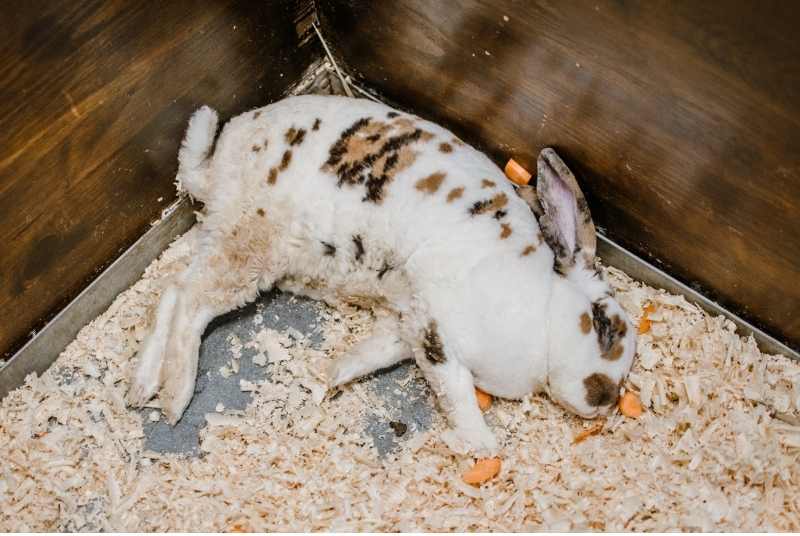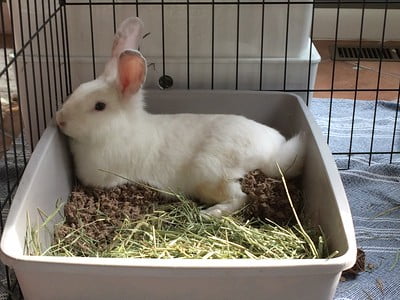Last Updated on February 26, 2023 by Marjon Ramos
While it doesn’t happen often, rabbits are known to have died from being so frightened by loud noises. Fireworks seem to be the main culprit, especially on the 4th of July celebrations.
There are a lot of reports from rabbit owners whose rabbits died due to what they called “bomb-like” fireworks. The most likely reason for a rabbit to die due to loud noises like fireworks is cardiac arrest triggered by a loud sound.
While there’s not much you can do to prevent your rabbit from dying induced by a loud sound, if they are prone to it (weak heart), you can lessen the chances of them dying by letting them free roam and muffling the sound in your place as much as possible.
Now that I’ve given you the gist of the article, read on as I explain in more detail how a rabbit can die from loud noises:
Table of Contents
How can rabbits die from loud noises?
Rabbits typically die from loud noises due to cardiac arrest. Rabbits in the wild often die from cardiac arrest induced by fright shortly after being captured by a predator.
The same thing can happen when a rabbit is startled by a loud sound like fireworks, gunshots, lightning strikes, heavy machinery, or sometimes even a barking dog can make a rabbit go into shock.
Your rabbit’s heart rate and blood pressure can increase to unsafe levels due to the perceived threats they feel when they hear a loud, unfamiliar sound like fireworks or gunshots.
In this news article by the BBC news where five pet rabbits died due to loud fireworks. A veterinarian stated that one of the rabbits probably had a stroke that caused it to die suddenly.
They also reported that prior to the rabbit’s death, all five of the rabbits were squealing from fright while the fireworks show was happening.
How to tell if your rabbit is scared of loud noises?

You can tell that your rabbit is frightened by loud sounds by looking at signs of distress in rabbits:
- Squealing or Grunting. Rabbits would rarely scream or make any noise unless it’s absolutely unavoidable. Prey creatures like rabbits would only make them more noticeable to predators if they made loud sounds all the time, so they learned to hide any signs of weakness like squealing. If your rabbit is squealing, you need to take this seriously and find out the cause. Your rabbit is likely scared of something or is in a lot of pain.
- Running away/hiding. Rabbits will usually run away and hide from what they perceive is a danger to them, and that includes loud noises.
- Restlessness. Rabbits that are frightened will also become restless, especially if the loud sound that’s bothering them is continuously happening.
- Shaking or heavy breathing. Shaking and heavy breathing are also a sign that your rabbit is in shock. Your rabbit might shake uncontrollably for hours, even if the loud sound that scared it is no longer happening.
Here’s a video of a shaking, frighted rabbit due to fireworks:
How to prevent your rabbit from dying caused by loud noises?
The best way to prevent your rabbit from dying from loud noises is to muffle the noise in your home as much as possible. You can use white noises to muffle sounds, close all of the windows, draw the curtains, hang a thick blanket on your curtain rods, and go to another room if available.
You should also play with your rabbit as much as possible if there are loud events currently happening within your vicinity that might scare off your rabbits.
Finally, letting your rabbit free roam during loud events can lessen your rabbit’s distress.
Most of the time, when a rabbit is startled by a loud unfamiliar sound, it will run away from it extremely fast.
Preventing your rabbit from acting on its instinct to run away would make their shock worse because they would feel trapped and unable to run away to safety.
So if your rabbit is enclosed in a cage and you expect that there’s going to be a fireworks show tonight, consider letting your rabbit free roam for the time being.
That way, when they do get frightened, they can run away to wherever they feel is safe. This in turn would at least give them some kind of comfort that they’re not trapped in the situation.
How long can a rabbit survive before dying caused by a loud noise?

Your rabbit would likely not die in an instant the moment it’s startled by a loud sound. It would depend on a lot of factors, like your rabbit’s current health, age, and what condition your rabbit would develop due to being frightened by loud noises (e.g., cardiac arrest, stroke, or stress).
But there are several reports of rabbits that died in as little as 12 hours after being so terrified of fireworks. The rabbit in the example likely died due to a cardiac arrest or stroke due to how fast it died.
As for stress, your rabbits can suffer long-term negative health effects if they are constantly experiencing stress due to loud sounds (e.g., construction site).
A stressed rabbit could stop eating. Rabbits that are not eating are at risk of developing dangerous digestive conditions like GI stasis and diarrhea that can be life-threatening if not treated.
When should you bring your rabbit to a veterinarian to prevent it from dying caused by loud noises?

You should take your rabbit to a veterinarian if they are exhibiting signs of distress like squealing, grunting, shaking, heavy breathing, and restlessness.
You should also watch out for any behavioral or bowel changes a few days later. Your rabbit might get better after being scared by a loud sound, then get traumatized by it.
If you did notice any changes in your rabbit’s behavior or bowel movements, you should contact a rabbit-savvy veterinarian for proper advice.
Conclusion
Rabbits have been reported to have died from loud noises like fireworks, gunshots, heavy machinery, thunderstorms, and barking dogs.
The most common reason why a rabbit would die from loud sounds is due to the increased heart rate and blood pressure that can trigger a cardiac arrest or stroke. Rabbits have been reported to have died in as little as 12 hours after being frightened by a loud sound like fireworks.
You can prevent your rabbit from dying from loud sounds by muffling the sound as much as possible by moving to another room, closing all the windows, curtains, and doors, playing background white noises, and putting a thick blanket on your curtain rod.
Cite this article:




